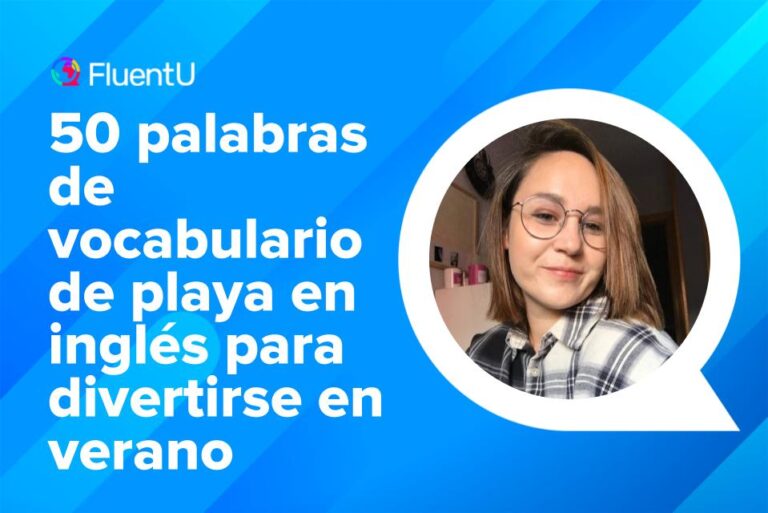Los 100 verbos más usados en inglés (con significados y ejemplos)

Todos los días, hablas unas 20.000 palabras.
¡Esas son más de 1.000 palabras por cada hora que estés despierto!
Pero, ¿cómo de bien conoces los verbos? ¿Los usas correctamente?
¿Conoces todas las situaciones en las que puedes usarlos? ¡Piénsalo!
Sigue leyendo para aprender algunos de los verbos más usados en inglés.
Download: This blog post is available as a convenient and portable PDF that you can take anywhere. Click here to get a copy. (Download)
Los 100 verbos más usados en inglés
Para poder expresarte y comunicarte bien, que te entiendan y hacerte entender, es muy importante aprenderse los verbos, su significado, sus usos y cómo se forman los distintos tiempos verbales.
Aquí he recopilado una lista con 100 verbos:
| Verbo en infinitivo | Pasado | Participio | Significado | Frases de ejemplo |
|---|---|---|---|
| to add | added | added | añadir | I will add sugar to my coffee. Voy a echar azúcar al café. |
| to agree | agreed | agreed | estar de acuerdo | They both agree on the decision. Ambos están de acuerdo con la decisión. |
| to allow | allowed | allowed | permitir | Please allow me to explain. Déjame explicarlo. |
| to answer | answered | answered | responder | He answered the phone quickly. Respondió el teléfono rápido. |
| to apologize | apologized | apologized | disculparse | She apologized for being late. Se disculpó por llegar tarde. |
| to ask | asked | asked | preguntar | Can I ask you a question? ¿Te puedo hacer una pregunta? |
| to be | was/were | been | ser o estar | He is a doctor. / I am at home. Es médico. / Estoy en casa. |
| to become | became | become | convertirse en, hacerse | She wants to become a chef. Quiere hacerse chef. |
| to begin | began | begun | empezar | Let's begin the project tomorrow. Empecemos mañana el proyecto. |
| to believe | believed | believed | creer | I believe in you. Creo en ti. |
| to belong | belonged | belonged | pertenecer a | This book belongs to me. Este libro es mío. |
| to bring | brought | brought | traer | Please bring your ID card. Trae tu carné de identidad. |
| to build | built | built | construir | They plan to build a new house. Tienen pensado construirse una nueva casa. |
| to buy | bought | bought | comprar | I need to buy groceries. Tengo que hacer la compra. |
| to call | called | called | llamar | I will call you later. Te llamo luego. |
| to change | changed | changed | cambiar | She wants to change her hairstyle. Quiere cambiar de corte de pelo. |
| to check | checked | checked | comprobar | Please check your email for updates. Comprueba el correo para nuevas actualizaciones. |
| to choose | chose | chosen | elegir | I will choose the blue dress. Elegiré el vestido azul. |
| to come | came | come | venir | They will come to the party. Vendrán a la fiesta. |
| to complain | complained | complained | quejarse | He likes to complain about the weather. Le gusta quejarse del tiempo. |
| to continue | continued | continued | continuar | The meeting will continue tomorrow. La reunión continuará mañana. |
| to cry | cried | cried | llorar | She cried when she watched the sad movie. Lloró cuando vio esa peli tan triste. |
| to dance | danced | danced | bailar | They love to dance at weddings. Les encanta bailar en las bodas. |
| to decide | decided | decided | decidir | Let's decide on a plan. Decidamos un plan. |
| to deliver | delivered | delivered | repartir o entregar | The postman will deliver the package. El cartero entregará el paquete. |
| to describe | described | described | describir | Can you describe the painting to me? ¿Me puedes describir el cuadro? |
| to die | died | died | morir | All living things eventually die. Todos los seres vivos acaban muriendo. |
| to do | did | done | hacer | What will you do tomorrow? ¿Qué harás mañana? |
| to dream | dreamt/dreamed | dreamt/dreamed | soñar | She often dreams of traveling the world. Sueña con viajar por el mundo. |
| to drink | drank | drunk | beber | I always drink water in the morning. Siempre bebo agua por la mañana. |
| to drive | drove | driven | conducir | She learned to drive last year. Aprendió a conducir el año pasado. |
| to eat | ate | eaten | comer | I want to eat pizza tonight. Hoy quiero cenar pizza. |
| to explain | explained | explained | explicar | Can you explain this concept to me? ¿Me puedes explicar este concepto? |
| to fall | fell | fallen | caerse | Be careful not to fall on the ice. Ten cuidado con no caerte en el hielo. |
| to feel | felt | felt | sentir | I feel happy today. Hoy me siento feliz. |
| to find | found | found | encontrar | Did you find your keys? ¿Encontraste las llaves? |
| to finish | finished | finished | terminar | He will finish the report by tomorrow. Terminará el informe mañana. |
| to follow | followed | followed | seguir | Please follow the instructions carefully. Sigue las instrucciones. |
| to forget | forgot | forgotten | olvidar | Don't forget your umbrella. No te olvides el paraguas. |
| to forgive | forgave | forgiven | perdonar | It's important to forgive and forget. Es importante olvidar y perdonar. |
| to get | got | got/gotten | conseguir | I need to get some groceries. Tengo que conseguir comida. |
| to give | gave | given | dar | She gave me a lovely gift. Me dio un bonito regalo. |
| to go | went | gone | ir | Let's go to the park. Vamos al parque. |
| to grow | grew | grown | crecer | Plants need sunlight to grow. Las plantas necesitan luz para crecer. |
| to have | had | had | tener | I have a new book to read. Tengo un nuevo libro para leer. |
| to hear | heard | heard | oír o escuchar | Can you hear the music? ¿Oyes la música? |
| to help | helped | helped | ayudar | She always helps her friends. Siempre ayuda a sus amigos. |
| to hide | hid | hidden | ocultar o esconder | They tried to hide their laughter. Intentaron ocultar la risa. |
| to hit | hit | hit | golpear | Please don't hit the table. No golpees la mesa. |
| to hold | held | held | agarrar | Hold my hand while we cross the street. Agarra mi mano cuando crucemos la calle. |
| to hope | hoped | hoped | esperar (desear) | I hope you have a great day. Espero que tengas un buen día. |
| to hurt | hurt | hurt | doler o hacer daño | Be careful not to hurt yourself. Cuidado con hacerte daño. |
| to include | included | included | incluir | The package should include everything. El paquete debería incluir todo. |
| to increase | increased | increased | aumentar | They want to increase their sales. Quieren aumentar las ventas. |
| to invite | invited | invited | invitar | I will invite my friends to the party. Invitaré a mis amigos a la fiesta. |
| to jump | jumped | jumped | saltar | The athlete can jump very high. El atleta salta muy alto. |
| to keep | kept | kept | mantener | Keep this document safe. Mantén este documento a salvo. |
| to know | knew | known | saber | I know her name. Sé su nombre. |
| to laugh | laughed | laughed | reír | The joke made everyone laugh. La broma hizo reír a todo el mundo. |
| to learn | learned | learned/learnt | aprender | She wants to learn a new language. Quiere aprender un nuevo idioma. |
| to leave | left | left | salir, irse | Don't leave without saying goodbye. No te vayas sin despedirte. |
| to like | liked | liked | gustar | I like chocolate ice cream. Me gusta el helado de chocolate. |
| to listen | listened | listened | escuchar | Please listen to what he has to say. Escucha lo que tiene que decir. |
| to live | lived | lived | vivir | They live in a beautiful house. Viven en una bonita casa. |
| to look | looked | looked | mirar | Look at that amazing sunset. Mira qué atardecer. |
| to lose | lost | lost | perder | Don't lose your keys again. No vuelvas a perder las llaves. |
| to love | loved | loved | amar | She loves her family very much. Ama mucho a su familia. |
| to make | made | made | hacer o preparar | Can you make a sandwich? ¿Me haces un sándwich? |
| to manage | managed | managed | gestionar | He can manage the project efficiently. Sabe gestionar el proyecto con eficiencia. |
| to meet | met | met | conocer, quedar | Let's meet for coffee. Quedemos para un café. |
| to move | moved | moved | mover | Please move the table to the corner. Mueve la mesa a la esquina. |
| to need | needed | needed | necesitar | I need some help with this task. Necesito ayuda con esto. |
| to offer | offered | offered | ofrecer | She offered her assistance. Ofreció su ayuda. |
| to open | opened | opened | abrir | Open the door for me, please. Ábreme la puerta, por favor. |
| to pay | paid | paid | pagar | I will pay for dinner tonight. Yo pago la cena hoy. |
| to play | played | played | jugar | We can play chess together. Podemos jugar al ajedrez juntos. |
| to prefer | preferred | preferred | preferir | I prefer tea over coffee. Prefiero el té antes que el café. |
| to prepare | prepared | prepared | preparar | They will prepare a delicious meal. Prepararán una comida deliciosa. |
| to promise | promised | promised | prometer | He promised to call me later. Me prometió que me llamaría luego. |
| to put | put[/fluentu_tts] | [fluentu-tts engine="neural" voice="Stephen"]put | poner | Put the book on the shelf. Pon el libro en la estantería. |
| to reach | reached | reached | alcanzar | She can't reach the top shelf. No alcanza a la estantería de arriba. |
| to read | read | read | leer | I love to read novels. Me encanta leer novelas. |
| to remember | remembered | remembered | recordar | I can't remember his name. No recuerdo su nombre. |
| to run | ran | run | correr | He runs every morning for exercise. Corre todos los días para hacer ejercicio. |
| to say | said | said | decir | What did he say about the situation? ¿Qué dijo de la situación? |
| to save | saved | saved | guardar | Save your work before closing the document. Guarda el trabajo antes de cerrar el documento. |
| to see | saw | seen | ver | I can see the mountains from here. Veo las montañas desde aquí. |
| to seem | seemed | seemed | parecer | It seems like a nice place to visit. Parece un buen lugar para visitar. |
| to talk | talked | talked | hablar | Let's talk about our plans for the weekend. Hablemos de los planes del fin de semana. |
| to thank | thanked | thanked | agradecer | I want to thank you for your help. Quiero agradecerte la ayuda. |
| to touch | touched | touched | tocar | Please don't touch the artwork. No toques las obras, por favor. |
| to travel | traveled | traveled/travelled | viajar | They love to travel to exotic destinations. Les encanta viajar a lugares exóticos. |
| to visit | visited | visited | visitar | I plan to visit my grandparents soon. Quiero visitar a mis abuelos pronto. |
| to wait | waited | waited | esperar | We will wait for you at the restaurant. Te esperamos en el restaurante. |
| to walk | walked | walked | caminar | I like to walk in the park. Me gusta caminar por el parque. |
| to want | wanted | wanted | querer | What do you want for your birthday? ¿Qué quieres para tu cumple? |
| to wash | washed | washed | lavar | She will wash the dishes after dinner. Lavará los platos después de cenar. |
| to win | won | won | ganar | She was thrilled to win the competition. Le hizo mucha ilusión ganar el concurso. |
| to work | worked | worked | trabajar | He works hard to support his family. Trabaja mucho para mantener a su familia. |
| to write | wrote | written | escribir | Can you write a letter to your friend? ¿Puedes escribir una carta a tu amigo? |
Cómo practicar los verbos en inglés
Representa los verbos
Transformar las palabras en acciones puede ayudarte a memorizar el vocabulario.
Escribe los verbos en papeles y ponlos en un sombrero. Saca un papel del sombrero y representa el verbo, luego otro, y otro, y así sucesivamente.
Puedes hacer esta actividad tú solo.
O, si tienes amigos que también están aprendiendo inglés, ¡podéis hacer un juego!
Juega a las adivinanzas. Mientras tú representas un verbo, tus amigos tienen que adivinar cuál es el verbo del papel.
Crea flashcards
Con este método de estudio memorizarás palabras rápidamente.
Escribe la palabra en inglés en una cara de la tarjeta y, en la otra, la definición (en inglés o en español, según tu nivel).Puedes comprar tarjetas físicas y crear una baraja a la antigua usanza. O descargar una aplicación que te permita crear mazos de flashcards digitales.
En el programa FluentU, puedes crear tus propios juegos de flashcards en función de los vídeos que veas o estudiar los mazos temáticos ya creados.
Escribe historias
Resulta útil saber utilizar los verbos por tu cuenta.
Intenta escribir una historia corta y ponte el reto de utilizar en ella 10 o 15 de los verbos que estás estudiando. Si tienes algún amigo que también estudie inglés, intercambiad las historias y corregid las del otro.
Si eres de los que recuerdan las cosas escribiendo, éste es un buen ejercicio para demostrar tus conocimientos.
Vayas donde vayas, mires donde mires, encontrarás un verbo. Cuando domines estos verbos básicos, podrás pasar a otros cada vez más avanzados.
Siempre hay algo nuevo que aprender.








